LET'S CELEBRATE GHANA @ 50.
THE INDEPENDENCE SQUARE
WELCOME 2 GHANA
| What To See | ||
Visit unique natural attractions, encounter, endagered, species of Monkeys, Crocrodiles, Elephants, experience the friendliness of the Ghanaian | ||
| ||||||||||
| ||||||||||
| ||||||||||||
| ||||||||||||
| ||||||||||||
| ||||||||||||
| ||||||||||||

THE BIG SIX
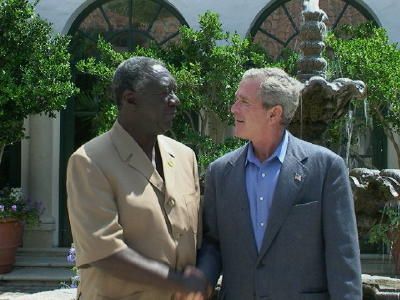
THE HISTORY OF GHANA
On 6 March 1957, the British colony of Gold Coast became independent and assumed the name Ghana. Until 1957, the Gold Coast consisted of the Gold Coast colony which comprised British processions on the Gold Coast littoral and extended less than one hundred miles inland up to the Pra; Ashanti, | ||||||
which included today’s Ashanti, Brong Ahafo and parts of Easter Region. A name Ghana was assumed at independence for three reasons. First, some of the founding fathers of Ghana argued that the Akan of the Gold Coast, who constituted 45% of the population were descendants of the ancient Ghana Empire that flourished from the 9th to the 13th Centuries between the Sahara and head waters of the Senegal and Niger rivers. Second, the spectacular example of ancient Ghana in building a great African empire that endured for three centuries was emulating by the emergent nation. Finally, the name was not ethnically specific to any of the countries numerous ethnic groups, it will therefore engender the spirit of national coercion and consciousness. | ||||||
The total land area of Ghana is 238,538 square kilometres (92,100 square miles); the southern coast line being 554 kilometres (334 miles) wide and the distance from the south to the north being 840 kilometres (522 miles). Ghana is located on the Gulf of Guinea and boarded on north by Burkina Faso on the east by the Republic of Togo and on the West by Cote d’Ivoire. | ||||||
Today, the population of Ghana is about 20 million with the highest population densities on the urban areas. The principal ethnic groups are the Akans who constitute about 45% of the population is made up of the Ashanti, the Fanti, the Ahanta, the Guan, the Bonu, the Akyem, the Akwamu, the Kwahu, the Akwapim, the Sefwi and the Nzema; the Mole, Dagbani, 16% is made up of Nanumba, Dagbani, Mamprusi, Wala, Bruilsa, Frafra, Talensi and Kusasi; the Ewe, 13% made up of the Anlo, the Some, the Tongu and the Ewedome; the Ga-Adangbe, 9% made up of the Ga, the Shai or Adamgbe, the Ada and the Krobo or the Kloli; the Gurma, 4% and the Grusi, 2% made up of the Mo, the Sisala, the Kasena, the Vagala and the Tampolene,. Living among the Ewe are non-Ewe speaking groups such as the Akpafu, the Lolobi, the Likpe, the Santrokofi, the Nkonya, the Avatime, the Logba and the Tafii. | ||||||
The peoples of Ghana are composed of two principal linguistic groups: the Gur and the Kwa group of languages, which are respectively spoken to the north and south of the Gurma and the Grusi and the speakers of Kwa are the Akan, the Guan, the Ewe and the Ga-Adamgbe. | ||||||
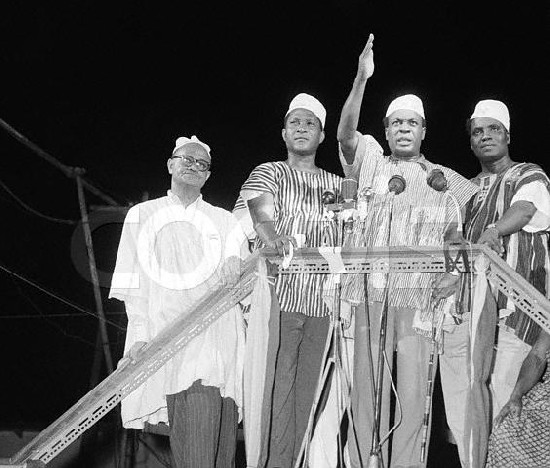
H.E. JOHN AGYEKUM KUFFOUR
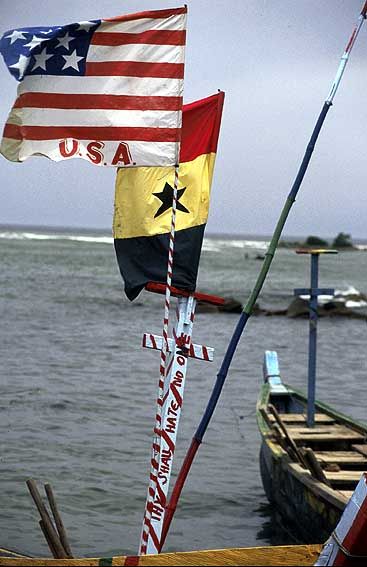
BRITISH COLONIAL RULE
Even though the British colonial rule, in the strict sense, was not established until after the Berlin Conference of 1884 - 1885, British power and jurisdiction in the Gold Coast began to take firm roots from the beginning of the 19th century when George Maclean laid the foundations for expansion of British influence. In 1830 Maclean arrived in Cape Coast and his instructions were explicit. He was not to interfere in the affairs of the states of the Gold Coast; he was only to ensure | ||||||||
that British interests were adequately protected. Maclean was, however, a practical man who realised that British trade and missionary activities would only thrive in an atmostphere of peace and order. Thus contrary to his remit he actually engaged the British, Fante and Asante in engendering harmonious relations that won him the admiration and confidence of all and ensured that trade between the coast and the interior flourished. Maclean’s term of office ended in 1843 and in that year he became the Judicial Assessor of British Forts on the coast until he died in 1847. | ||||||||
Commander Hill, who was appointed Lieutenant-Governor of British Forts and Castles in the Gold Coast, succeded Maclean. He recognised that the success of his predecessor derived in part from the harmonious relations that he established in the Gold Coast; he therefore proceeded to formalize the relations in a short document of three paragraphs signed initially by seven coastal chiefs on 6th March 1844 and subsequently by ten other chiefs. The document, which has be come to be known as the Bond of 1844, represented the first major imperial assault on the rights and powers of Gold Coasters to administer their own affairs. It outlawed certain customary practices and provided that criminal cases were to be tried by British officials in conjunction with the chiefs. | ||||||||

VICE PRESIDENT ALIU MAHAMA

OUR LEADERS
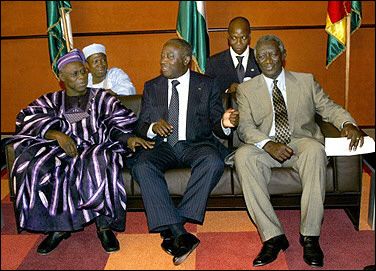
Description of ProductPresident John Agyekum Kufuorhas has offered an live branch to former President Rawlings. Speaking to BBC hour long “Have Your Say” programme hosted by Peter Biles, Kufuor said he and Rawlings must let bygones be bygones and forge a relationship on a clean slate.
The interview, conducted at the Castle, Osu last Wednesday February 28, would be aired on television, internet and radio on Sunday March 4 at 2:00pm.
A source close to the BBC, told Daily Guide that an avalanche of questions on about 30 pages of internet space were thrown at the Chairman of the African Union (AU) and Ghanaian President.
The President pointed out that there had been slips here and there from both sides, but the occasion of the 50th anniversary of Ghana’s independence, in his view, called for a ceasefire and the forging of new beginnings.
Kufuor noted, according to a source, that it was in this spirit that he dispatched 8 eminent citizens to the former president to invite him to the celebrations on Tuesday, March 6.
He hinted that although Rawlings is yet to confirm his participation in the upcoming events, he was confident that former President would be part of all the activities lined up for the jubilee in a spirit of oneness.
The president, Daily Guide learnt, emphasized his position in his maiden speech in 2001 when he stated that he would treat his predecessor as he would want to be treated. Responding to several other questions, the President stressed his vision for Ghana and Africa.
On Ghana, he reiterated that infrastructural development and private sector development were necessary for the rapid development of the country. These, he said would place it in a competitive advantage over the rest of the world.
Ghana, he added, was still blazing the trail of leadership, as highlighted at independence. He noted also that his agenda was to show good leadership which would impact positively on its neigbours and other African countries. 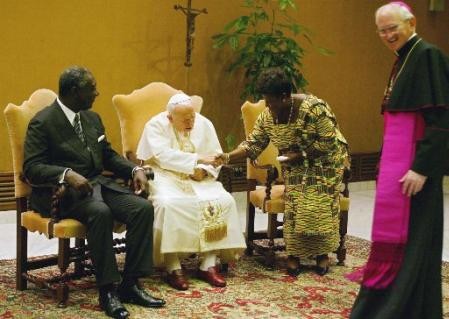
| ||||||||||||||||||||||||||||







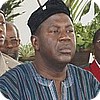
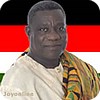
 Ghana at Independence in 1957 adopted a centrally planned economy model with heavy state participation in economic activities and regulation of prices and wages. After a Coup d’etat in 1966, attempts were made to de-regulate the economy with mild success.
Ghana at Independence in 1957 adopted a centrally planned economy model with heavy state participation in economic activities and regulation of prices and wages. After a Coup d’etat in 1966, attempts were made to de-regulate the economy with mild success.